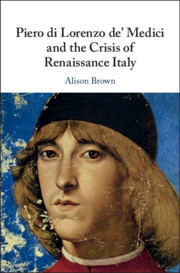'In this detailed, compelling biography, Piero de’ Medici emerges as far more complex and subtle than historians have previously credited. Brown reveals his attempts to navigate an almost-impossible situation as emblematic of the wider transformation of political morality and culture in Italy provoked by the crisis of the 1490s.'
Nicholas Scott Baker - Macquarie University, Sydney
'Alison Brown, premier historian of Renaissance Florence, crafted a compelling, revisionist biography of Lorenzo the Magnificent’s ill-fated son and heir Pero. The book is carefully researched in the Medici papers and engagingly written. A must read on the Florentine Republic’s decline during the disastrous wars that crushed independent Italian city-states.'
Melissa M. Bullard - University of North Carolina, Chapel Hill
'Brown’s magisterial and elegantly-written study provides the first detailed examination of the career of Piero di Lorenzo de’ Medici and offers, in the process, an entirely new perspective on Florentine and Italian politics at the time of the French invasion at the end of the fifteenth century.'
William Caferro - Vanderbilt University, Nashville
'Lorenzo the Magnificent's son Piero was blamed for the collapse of the Florentine republic, surrendering to France in 1494. Using overlooked Medici letters, Brown reveals how his attempt to emulate the acrobatic politics of his father, balancing the powers of Italy and his own roles of prince and citizen, drove him to desperation.'
Dale Kent - University of California, Riverside
'Brown expertly uses a wealth of unpublished letters to reconstruct the cultural tensions of Piero’s life before exile and his fruitless search for repatriation in the complex world of Italian politics. A splendid work that brings new light to a critical period of Italian history.'
John Najemy - Cornell University, New York
‘This is an impressive monograph that fills a surprising gap in the historiography … It is archival sleuthing and research at its best. The book adds new nuance to this previously shadowy figure, and in doing so provides a stronger foundation for future studies on the politics of the Italian Peninsula, especially Florence, in the late Quattrocento.’
Brian J. Maxson
Source: H-Net
‘Debunking the many myths around this enigmatic member of the Medici family through a meticulous, unprejudiced examination of his life and historical context is without a doubt the greatest virtue of Alison Brown’s important new book.’
Stefano Dall’Aglio
Source: Journal of Modern History



